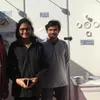NID student’s zero waste manufacturing process wins the James Dyson India Award
NID student Shashank Nimkar has been awarded the James Dyson India Award for developing a method to use manufacturing waste to make other products.
Turning raw materials into consumer products generate a lot of waste, though some part of it is absorbed into the value chain. Shashank Nimkar from the National Institute of Design (NID), Ahmedabad, has developed a method to use this waste to make other products.
Known as 'Earth Tatva,' his invention went on to win him the James Dyson India Award 2020, reported The Logical Indian.
Nimkar utilised ceramic waste commonly called 'grog,' as well as clay, which were usually discarded after the production process to make brand-new commodities. The highlights of these products are that they could be manufactured with zero waste and also recycled a lot of times.

Shashank Nimkar
Image credits: The Indian Express
He also claims that his invention can likely decrease the mining activities for natural resources and dumping waste in landfills up to 60 percent.
“We use this pulverised form of waste called 'grog,' as a major portion of raw material up to 60-70 percent, with a minimum amount of virgin clay,” Nimkar told The Indian Express.
The invention — which made it to the James Dyson Awards India 2020 — got Nimkar prize money worth £2,000 (about 1.90 lakh). It germinated as part of a project that he was involved in while pursuing his Master’s degree.
“I have always been fascinated by the idea of turning waste into a valuable resource. While working on design solutions, I often wonder what happens to the products and materials at their end of life. On this project, I kept asking myself, “how I can add value from the inside and not just from a functional or aesthetic point of view.” That is how the idea of a universal material was conceived against making a product,” Nimkar said.
“Since day one, the aim was to make a closed-loop material that can be incorporated in a zero-waste manufacturing process,” he added.
Out of the 241 entries for this year's accolade, 93 were shortlisted. Both IIT Madras, as well as a team from NID, Ahmedabad, were the runners up for their project Drishti.
Edited by Suman Singh







